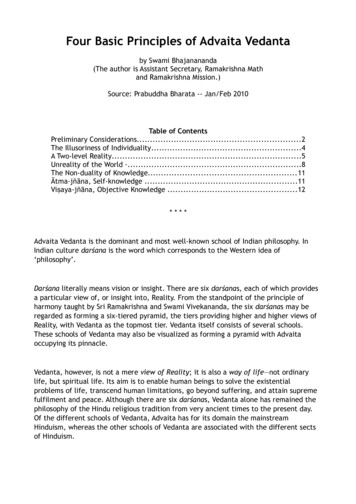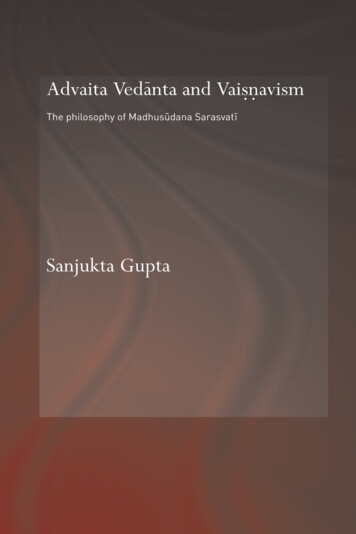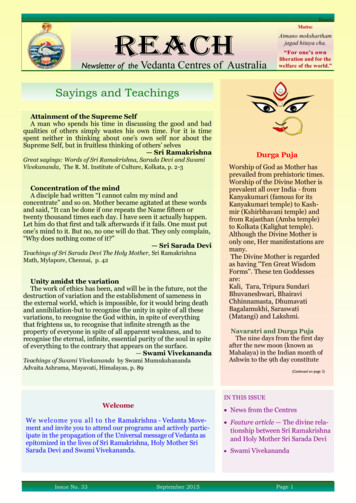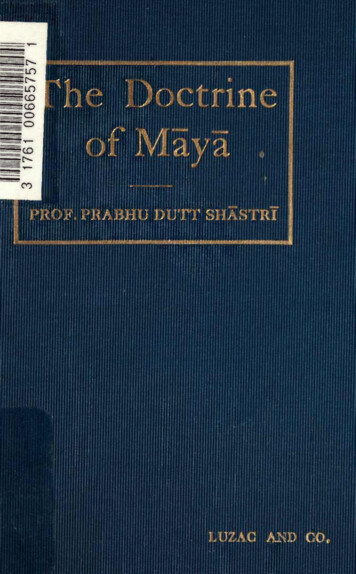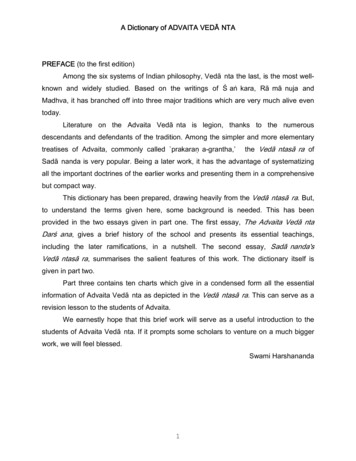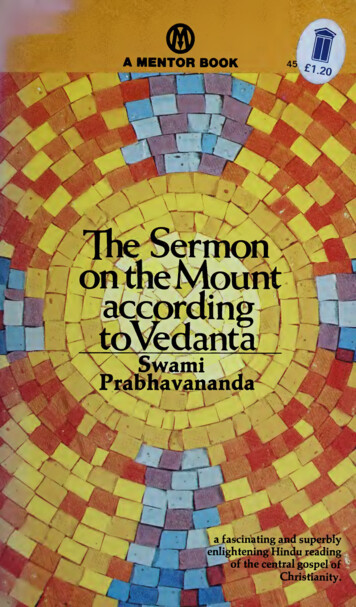
Transcription
Karma Yogai
Karma YogaWritingsAddress by Swami Vivekananda on “The Ideal of a Universal Religion”Vedanta Philosophy: Lectures by the Swami Vivekananda on “The Cosmos”Vedanta Philosophy: Lecture by the Swami Vivekananda on “The Atman”Vedanta Philosophy: Lecture by the Swami Vivekananda on “The Real and ApparentMan”Vedanta Philosophy: Lecture by the Swami Vivekananda on “Bhakti Yoga”The Vedanta Philosophy: An Address Before the Graduate Philosophical Society ofHarvard UniversityVedanta Philosophy: Eight Lectures by the Swami Vivekananda on Karma Yoga (TheSecret of Work)Vedanta Philosophy: Lectures by the Swami Vivekananda on Raja Yoga and OtherSubjectsMy MasterVedanta Philosophy: Lectures by the Swami Vivekananda on Jnana Yogaii
Vedanta PhilosophyEight Lectures onKarma YogaThe Secret of WorkDelivered under the Auspices of the Vedanta Society1896Swami Vivekananda1863–1902信YOGeBooks: Hollister, MO2013:09:01:20:35:28iii
Vedanta Philosophy Eight Lectures on Karma YogaCopyrightYOGeBooks by Roger L. Cole, Hollister, MO 65672 2010 YOGeBooks by Roger L. ColeAll rights reserved. Electronic edition published 2010isbn: 978‑1‑61183‑026‑2 (pdf)isbn: 978‑1‑61183‑027‑9 (epub)www.yogebooks.comiv
ContentsI. Karma in its Effect on Character.II. “Each is Great in His Own Place.”III. The Secret of Work.IV. What is Duty?V. We Help Ourselves, not the World.VI. Non‑Attachment is Complete Self‑Abnegation.VII. Freedom.VIII. The Ideal of Karma Yoga.v
Vedanta Philosophy Eight Lectures on Karma Yogavi
Preface.The word Karma is fully explained in the text of this book,but possibly it may not be out of place to give a brief ideaof what is meant by Yoga. This word, which sounds strangeto Western ears, is nevertheless an old friend in a foreign dress.Its literal meaning is “To join,” and it has the same root (Yug)behind it as our own familiar word “yoke.” When Yoga is usedtechnically, it signifies union of the human with the Divine, andthe particular name given to that union (or Yoga) stands for themethod by which it is attained. Hence, Karma Yoga means theendeavor to reach Divine realization through unselfish work.Karma Yoga might be called “applied ethics” in the highestsense, rather than a merely theoretical system. This book isintended to give an insight into the manner of so performingthe inevitable tasks of daily life as to lift our lives out of theregion of the humdrum and the commonplace and makethem pathways to the loftiest heights of spiritual realization.It presents its own solution of the eternal problem how we,too, “can make our lives sublime,” and gives an uplift to humanendeavor on even the humblest planes.Karma Yoga proclaims the dignity of labor in a way peculiarlyits own, and has words of help and encouragement for all gradesof toilers in the world’s great workshop.vii
Vedanta Philosophy Eight Lectures on Karma YogaTo those who imagine that Vedânta teaches but one roadto salvation, this book will be a revelation. Its language isunmistakable when it asserts over and over again that sameheight of spiritual realization that is reached by him who givesup the world, is also attained by him who knows how to live inthe world and be not of it.Karma Yoga admits the necessity of work, but shows ushow to be free from its bondage, how to work as masters, notas slaves. We can so transmute our commonest actions intospiritual treasure, as to glorify existence and make it a gatewayto Paradise.The Editor.viii
Karma Yoga1
Karma Yoga2
I.TKarma in its Effect onCharacter.he word Karma is derived from the Sanskrit “Kri,” to do;everything that is done is Karma. Technically, this wordalso means the effects of actions. In connection withmetaphysics it sometimes means the effects of which our pastactions were the causes. But in Karma Yoga we have simplyto do with the word “Karma” as meaning work. The goal ofall mankind is knowledge; that is the one ideal placed beforeus by the Eastern philosophy. Pleasure is not the goal of man,but knowledge. Pleasure and happiness come to an end. It isthe mistake of mankind to suppose that pleasure is the goal;the cause of all the miseries we have in the world is that menfoolishly think pleasure to be the ideal. After a time man findsthat it is not happiness, but knowledge, towards which he isgoing, and that both pleasure and pain are great teachers, thathe learns as much from evil as from good. As pleasure and painpass before his soul they leave upon it different pictures, andthe result of these combined impressions is what is called man’s“character.” If you study the character of any man, what is itreally but the tendencies, the sum total of the bent of his mind?3
Karma YogaYou will find that misery and happiness were equal factors inthe formation of that character. Good and evil have an equalshare in moulding character, and in some instances misery is agreater teacher than happiness. In studying the great charactersthat the world has produced I dare say that, in the vast majorityof cases, it was misery that taught more than happiness; itwas poverty that taught more than wealth; it was blows thatbrought out the inner fire, more than praise.Now this knowledge, again, is inherent in man; no knowledgecomes from outside; it is all within. What we say a man “knows,”should, in strictly psychological language, be a man “discovers;”what a man “learns” is really what a man “discovers,” theword discover meaning “he takes the covering from his ownsoul,” which is a mine of infinite knowledge. We say Newtondiscovered gravitation. Was it sitting anywhere in a cornerwaiting for him? It was in his own mind; the time came and hefound it out. All knowledge that the world has ever receivedcomes from the mind; the infinite library of the universe is inyour own mind. The external world is simply the suggestion, theoccasion, which sets you to study your own mind, but the objectof your study is always your own mind. The falling of an applegave the suggestion to Newton, and he studied his own mind;he rearranged all the previous links of his mind and discovereda new link among them, which we call the law of gravitation.It was not the apple nor anything in the centre of the earth.All knowledge, secular or spiritual, is in the human mind. Inmany cases it is not discovered, but remains covered, and whenthe covering is being slowly taken off we say “we are learning,”and the advance of knowledge is made by the advance of thisprocess of uncovering. The man from whom this veil is beinglifted is the more knowing man; the man upon whom it liesthick is ignorant, and the man from whom it has entirely goneis the all‑knowing, the omniscient. There have been omniscientmen, and, I believe, will be yet, and that there will be myriadsin the cycles to come. Like fire in a piece of flint, knowledge is4
Karma in its Effect on Character.existing in the mind; the suggestion is the friction that bringsout that fire. So with all our actions—our tears and our smiles,our joys and our griefs, our weeping and our laughter, our cursesand our blessings, our praises and our blames—with every oneof them we find, if we calmly study our own selves, that theyhave been brought out by so many blows. The result is whatwe are; all these blows taken together are called “Karma,” work.Every mental and physical blow that is given upon the soul tostrike out the fire, to discover its own power and knowledge, isKarma, Karma being used in its universal sense; so we are doingKarma all the time. I am talking to you; that is Karma. You arelistening; that is Karma. We breathe; that is Karma. We walk;Karma. We talk; Karma. Everything we do, physical or mental,is Karma, and is leaving its marks upon us.There are certain works which are, as it were, the aggregate,the sum total, of a large number of small works. If we stand nearthe seashore and hear the waves dashing against the shingle wethink it is such a great noise, and yet we know that one wave isreally composed of millions and millions of minute waves; eachone of these is making a noise, and yet we do not catch thesound of them; it is only when they become the big aggregatethat we catch it. So every pulsation of the heart is makingwork; certain works we feel, and they become tangible to us;they are, at the same time, the aggregate of a number of smallworks. If you really want to judge the character of a man looknot at his great works. Every fool becomes a hero at one timeor another. Watch a man do his most common actions; thoseare the things which will tell you the real character of a greatman. Great occasions rouse even the lowest of human beingsto greatness, but he is a really great man whose character isgreat always, the same wherever he be.This Karma in its effect on character is the most tremendouspower that man has to deal with. Man is a centre, as it were, andhe is attracting all the powers of the universe towards himself,and in this centre is fusing them all and ejecting them again5
Karma Yogain a big current. That centre is the real man, the almighty, theomniscient, and he draws the whole universe towards him; goodor bad, misery or happiness, all running towards him, clinginground him, and out of them he fashions the tremendous powercalled character and throws it outwards. As he has the powerof drawing in anything, so he has the power of throwing it out.All the actions that we see in the world, all the movementsin human society, all the works that we have around us, aresimply the display of thought, the manifestation of the willof man. Machines or instruments, or cities, ships, men‑of‑war,everything is simply the manifestation of the will of man, andthis will is made by character, and character is manufacturedby Karma. As is Karma, so is the manifestation of the will. Thetremendous willed men that the world has produced haveall been tremendous workers—gigantic souls, with wide wills,powerful enough to overturn worlds; and they got that bypersistent work, through ages and ages. Such a gigantic willas that of a Buddha or a Jesus cannot be got in one life, forwe know who their fathers were. It is not known that theirfathers ever spoke a word for the good of mankind. Millionsand millions of carpenters like Joseph have gone; millions arestill living. Millions and millions of petty kings like Buddha’sfather have been in the world. If it is only a case of hereditarytransmission, how do you account for this little petty prince,who was not, perhaps, obeyed by his own servants, producingthis son, whom half a world worships? How do you accountfor this gap between the carpenter and his son, whom millionsof human beings regard as God? It cannot be accounted forby that theory. This gigantic will which Buddha threw over theworld, which came out of Jesus, whence did it come? Whencecame this accumulation of power? It must have been therethrough ages and ages, continually growing bigger and bigger,until it burst on society in a Buddha or a Jesus, and it rolls downeven to the present day.6
Karma in its Effect on Character.And all this is determined by Karma, work. No one can getanything except he earns it; this is an eternal law; we may thinkit is not so, but in the long run we shall be convinced of it. Aman may struggle all his life in becoming rich; he may cheatthousands, but he finds at last that he did not deserve it, andhis life becomes a trouble and a nuisance to him. We may goon accumulating for our physical enjoyment, but only what weearn is ours. A fool may buy all the books in the world, but theywill be in his library, and he will only be able to read those hedeserves, and this deserving is produced by Karma. Our Karmadetermines what we deserve and what we can assimilate. We areresponsible for what we are, and whatever we want ourselvesto be we have the power to make ourselves. If what we are nowhas been made by our own past actions it certainly follows thatwhatever we want to be we can make ourselves by our presentactions; so we have to know how to act. You will say, “What isthe use of learning how to work? Every one works in this world.”But there is such a thing as frittering away our energies. Withregard to this Karma Yoga, in the Bhagavad Gîtâ it is said thatKarma Yoga is doing work, but with cleverness and as a science;knowing how to do work that will bring the greatest results.You must remember that all this work is simply to bring outthe power of the mind which is already there, to wake up thesoul. The power is inside every man, and the knowledge is there;these different works are like blows to bring it out, to cause thisgiant to wake up.A man works for various motives; there cannot be workwithout a motive. Some people want to get fame, and theywork for fame. Others want to get money, and they work formoney. Others want power, and they work for power. Otherswant to get to heaven, and they work to get to heaven. Otherswant to leave a name when they die, as they do in China, whereno man gets a title until he is dead; that is a better way, after all.When a man does very good things they give a title of nobilityto his father, who is dead, or to his grandfather. Some of the7
Karma YogaMohammedan sects work all their lives to have a gigantictomb when they die. I know sects among whom, as soon asa child is born, they begin to prepare for his tomb; that is thegreatest work a man has to do, and the bigger and finer thetomb the better off the man is supposed to be. Others workas a penance; do all sorts of wicked things, then erect a temple,or give something to the priests to buy them off and give thema passport to heaven. They think that will clear them and thatthey will go scot‑free. These are some of the various motivesfor work.Work for work’s sake. There are a few who are really the salt ofthe earth in every country and who work for work’s sake, whodo not care for name, or fame, or to get to heaven. There areothers who do good to the poor and help mankind from stillhigher motives, because it is good, and they love good. Desiresfor name and fame seldom bring immediate results; as a rule,they come to us when we are old and are done with life. If aman works without any selfish motive in view what becomesof him? Does he not gain anything? Yes, he is the highest gainer.Unselfishness pays more, only people have not the patience topractise it. It is more paying in physical value also. Love, andtruth, and unselfishness are not only moral figures, but arethe highest ideals, because they are such manifestations ofpower. In the first place, a man who can work for five days, orfor five minutes, without any selfish motive whatever, withoutthinking of the future, or heaven, or punishment, or anythingof the kind, becomes a giant. It is hard to do it, but in the heartof our hearts we know the value of it, and what good it brings.It is the greatest manifestation of power and a tremendousrestraint; to restrain is a manifestation of more power than alloutgoing action. A carriage with four horses may rush down ahill without restraint; or, the coachman may restrain the horses.Which is the greater manifestation of power, to let them go orto restrain them? A cannon‑ball flying through the air goes along distance and then falls. Another is cut short in its flight8
Karma in its Effect on Character.by striking against a wall, and intense heat is generated. So, allthis outgoing following a selfish motive, goes away; it will notreturn to you, but if it be restrained it will develop. Restraintwill produce a gigantic will, that character which makes a worldmove. Foolish men do not know the secret; they want to rulemankind. Man does not know that he can rule the whole worldif he waits. Let him wait a few years, restrain that foolish ideaof governing, and when that idea is wholly gone that man willbe a power in the world. But we are such fools! The majority ofus cannot see beyond a few years, just as animals cannot seebeyond a few steps. Just a little narrow circle; that is our world.We have not the patience to look beyond and thus we becomeimmoral and wicked. It is our weakness, our powerlessness.But the lowest sorts of work are not to be despised. Let a manwho knows no better, work for selfish ends, for name and fame;but a man should always try to get towards the higher motiveand to understand what that motive is. Krishna tells us in theGîtâ, “To work you have the right, but not to the fruits thereof.”Leave the fruits alone, leave results alone. Why care for results?When wanting to help a man, never think what that man’sattitude should be towards you. Do not care to understand. Ifyou want to do a great or a good work, do not trouble to thinkwhat the results will be.There comes another difficult question with this sort of work.Intense activity is necessary; we must always work. We cannotlive a minute without work. What becomes of rest? Here isone side of life‑struggle work, to be whirled rapidly round inthe current of social life. And here is another picture—calm,retiring, everything peaceful around you, very little of noise,only nature. Neither of them is a perfect picture. If a man goesto live in such a place as soon as he is brought in contact withthe surging whirlpool of the world he will be crushed by it;just as the fish that lives in the deep sea water, as soon as it isbrought to the surface, breaks into pieces; the weight of wateron it had kept it together. Can a man who has been used to the9
Karma Yogaturmoil and the rush of life live if he comes into a quiet place?He will suffer and perhaps lose his mind. Very few are able tobear entire solitude. The ideal man is he who in the midst ofthe greatest silence finds the intensest activity and in the midstof the intensest activity finds the silence of the desert. He haslearned the secret of restraint; he has controlled himself. Hegoes through the streets of a big city, with all their traffic, andhis mind is as calm as if he were in a cave, where not a soundcould reach him, and he is working intensely all the time. Thatis the ideal of Karma Yoga, and if you have attained to that youhave really learned the secret of work.But we have to begin from the beginning, to take up theworks as they come to us and slowly make ourselves moreunselfish every day. We must do the work and find out themotive power that is behind, prompting us to the work, and,almost without exception, in the first years, we will find thatthe motives are always selfish, but gradually this selfishness willmelt, by persistence, and at last will come the time when weshall be able to do really unselfish work. We all hope that sometime or other, as we struggle through the path of life, there willcome a time when we shall become perfectly unselfish, and themoment we attain to that, our powers will be concentrated,and the knowledge which is ours will become manifest.10
II.“Each is Great in His OwnPlace.”According to the Sankhya philosophy, nature iscomposed of three materials, called, in Sanskrit, Sattva,Rajas and Tamas. Tamas is typified as darkness orinactivity; Rajas as activity, where each particle is trying to flyoff from the attracting centre, and Sattva is the equilibriumof the two, getting a control of both. Each man is composedof these three materials; in each of us we find that sometimesthe Tamas prevails; we become lazy; we cannot move; we areinactive, bound down by certain ideas. At other times activitywill prevail, and at still other times that calm control of bothwill prevail—the Sattva. Again, in different men, one of thesematerials is generally predominant. The characteristic of oneman is that of inactivity, dullness and laziness; the characteristicof another man is activity, power, manifestation of energy, andin still another man we find the sweetness, calmness, gentleness,which are controlling both. So in creation—in animals, plantsand men—we find the typification of all these differentmaterials.11
Karma YogaKarma Yoga has specially to deal with these three elements.By teaching us what they are and how to employ them it helps usto do our work better. Human society is a graded organization.We all know about morality, and we all know about duty, butat the same time we find that in various countries moralitydiffers greatly. What is regarded as moral in one country may inanother be considered perfectly immoral. Yet we have the ideathat there must be a universal standard of morality. So it is withduty. The idea of duty varies much among different nations.Two ways are left open to us—the way of the ignorant, whothink that there is only one way to truth, and that all the rest arewrong, or the way of the wise, who admit that, according to themental constitution or the different plane of existence in whichwe are, duty and morality may vary. The important thing is toknow that there are gradations of duty and of morality—thatwhat is the duty of one state of life in one set of circumstanceswill not be that of another.The following example will serve to illustrate:—All greatteachers have taught “resist not evil”—that non‑resisting evilis the highest ideal. We all know that if a certain number ofus attempted to put that into practice the whole social fabricwould fall to pieces, society would be destroyed, the wickedwould have possession of our properties and our lives andwould do whatever they liked with us. Even if only one day ofsuch non‑resistance were practised it would lead to the utterdissolution of society. Yet, intuitively, in our heart of hearts wefeel the truth of the teaching, “resist not evil.” This seems to usto be the great ideal; yet to teach this doctrine only would beequivalent to condemning a vast proportion of mankind. Notonly so, it would be making men feel that they were alwaysdoing wrong, cause scruples of conscience in all their actions; itwould weaken them, and that constant self‑disapproval wouldbreed more vice than any other weakness. To the man who hasbegun to hate himself the gate to degeneration has been opened,and so with a nation. Our first duty is not to hate ourselves; to12
“Each is Great in His Own Place.”advance we must have faith in ourselves first and then in God.He who has no faith in himself can never have faith in God.Therefore, the only alternative remaining to us is to recognizethat duty and morality vary under different circumstances;not that the man who resists is doing something wrong, butthat in the different circumstances in which he is placed it maybecome his duty to resist.In reading the Bhagavad Gîtâ many of you in Westerncountries may have felt astonished at the second chapter,when Krishna calls Arjuna a hypocrite and a coward becauseof his refusal to fight or offer resistance on account of hisadversaries being his friends and relatives, making the plea thatnon‑resistance was the highest ideal of love. The great lessonto learn is that the two extremes are alike; the extreme positiveand the negative are always similar; when the vibrations oflight are too slow we do not see them, nor do we see themwhen they are too rapid. So with sound; when very low we donot hear, when very high we do not hear. In like manner is thedifference between resistance and non‑resistance. One mandoes not resist because he is weak, lazy, and cannot, and notbecause he will not; the other is the man who, knowing that hecan strike an irresistible blow if he likes, not only does not strike,but blesses his enemies. The one who resists not from weaknesscommits a sin, and as such will not receive any benefit fromhis non‑resistance, while the other would commit a sin byoffering resistance. Buddha gave up his throne and renouncedhis position; that was true renunciation; but there cannot beany question of renunciation in the case of a beggar who hasnothing to renounce. So we must always take care, when wespeak of this non‑resistance and ideal love, what we reallymean. We must first take care to understand whether we havethe power of resistance or not. Then, having the power, if werenounce and do not resist, we are doing a grand act, but if wecannot resist and at the same time try to deceive ourselves thatwe are actuated by motives of the highest love we are doing13
Karma Yogathe exact opposite. So Arjuna became a coward at the sight ofthe mighty array against him; his “love” made him forget hisduty towards his country and king. That is why Krishna toldhim that he was a hypocrite:—“Thou talkest like a wise man,but thy actions betray thee to be a coward; therefore, stand upand fight!”Such is the idea of the Karma Yogi. The Karma Yogi is theman who understands that the highest ideal is non‑resistance,but who also knows that this is the highest manifestation ofpower, and that what is called “resisting evil” is but a step onthe way towards the manifestation of the highest power, whichis non‑resistance. Before having attained the highest idealhis duty is to resist; let him work, let him fight, let him strikestraight from the shoulder. Then only, when he has gained thepower to resist, will non‑resistance be a virtue.Inactivity should be avoided by all means. Activity alwaysmeans resistance. Resist all evils, mental and physical, and whenyou have succeeded in resisting, then will calmness come. It isvery easy to say, “hate not anybody, resist not any evil,” but weknow what that means. When the eyes of society are turnedtowards us we may make a show of non‑resistance, but inour hearts it is canker all the time. We feel the want of it; wefeel that it would be better to resist. If you desire wealth andyou know that the whole world will tell you that he who aimsat wealth is a very wicked man, you, perhaps, do not dare toplunge into the struggle for wealth, yet at the same time themind is running day and night after money. This is hypocrisyand will serve no purpose. Plunge into the world, and then, aftera time, when you have enjoyed all that is in it, will renunciationcome; then will calmness come. So fulfil your desire for powerand everything else, and after you have fulfilled the desire willcome the time when you will know that these are very littlethings; until you have fulfilled this desire, until you have passedthrough that activity, it is impossible for you to come to thatstate of calmness and serenity. These ideas of serenity have14
“Each is Great in His Own Place.”been preached for thousands of years; everybody born hasheard them from childhood, and yet we see very few in theworld that have really reached that stage. I do not know if Ihave seen twenty persons in my life who were really calm andnon‑resisting, and I have travelled over half the world.Every man should take up his own ideal and endeavor toaccomplish it; that is a surer way than taking up other men’sideals, which he can never hope to accomplish. For instance,we take a child and at once give him the task of walking twentymiles; either the little one dies or one in a thousand may crawlthe twenty miles, to reach the end exhausted and half dead.That is what we generally try to do with the world. All men andwomen, in any society, are not of the same mind, or capacity,and have not the same power to understand things; they musthave different ideals, and we have no right to sneer at any ideal.Let every one do the best he can for his own ideal. I shouldnot be judged by yours or you by mine. The apple tree shouldnot be judged by the standard of the oak nor the oak by thatof the apple. To judge the apple tree you must take the applestandard and for the oak its own standard, and so with all of us.Unity in variety is the plan of creation. However men andwomen may vary individually, there is unity in the background.The different individual characters and classes of men andwomen are natural variations in the law of creation. Hence, weought not to judge them by the same standard or put the sameideal before them. Such a course creates only an unnaturalstruggle, and the result is that man begins to hate himself andis hindered from becoming religious and good. Our duty isto encourage every one in his struggle to live up to his ownhighest ideal and strive to make this ideal as near as possible tothe truth. In the Hindu morality we find that this fact has beenrecognized from very ancient times, and in their Scriptures andbooks on ethics different rules are laid down for the differentclasses of men, for the householder, the Sannyâsin (the manwho has renounced the world) and the student.15
Karma YogaThe life of every individual, according to the Hindu Scriptures,has its peculiar duties apart from what belongs to universalhumanity; to each stage of life certain duties are attached byits own nature. No one of these stages of life is superior to theother; the life of the married man is quite as great as that ofthe man who is not married, but who has devoted himself toreligious work. The king on his throne is as great and glorious asthe scavenger in the street. Take him off his throne, make himdo the work of the scavenger and see how he will fare. Takethe scavenger and see how he will rule. It is useless to say thatthe man who lives out of the world is a greater man than hewho lives in the world; it is much more difficult to live in theworld and worship God than to give it up and live a free andeasy life. The householder marries and carries on his duties asa citizen, while the duties of the man who gives up the worldare to devote his energies only to religion. If a man goes out ofthe world to worship God he must not think that those wholive in the world and work for the good of the world are notworshipping “God; neither must those who live in the world,for wife and children, think that those who give up the worldare low vagabonds. Each is great in his own place.This thought I will illustrate by a story. A certain king used toinquire of all the Sannyâsins that came to
Vedanta Philosophy: Lecture by the Swami Vivekananda on “Bhakti Yoga” The Vedanta Philosophy: An Address Before the Graduate Philosophical Society of Harvard University Vedanta Philosophy: Eight Lectures by the Swami Vivekananda on Karma Yoga (The Secret of Work) Vedanta Philosophy: Lectures by the Swami Vivekan

